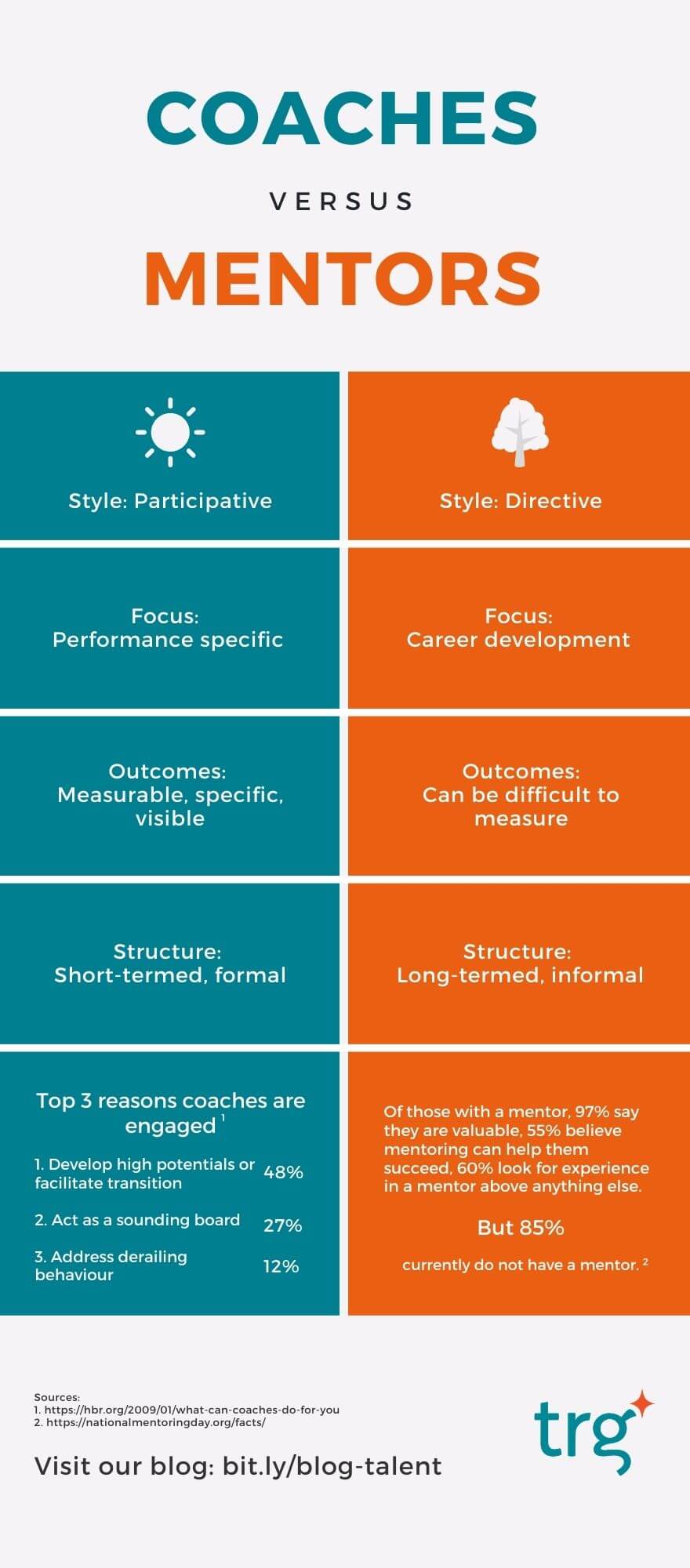Coaching and mentoring are two terms often used interchangeably with each other – and yet, there are certain gaps that need to be defined. Although they require similar skills and are both essential for personal growth, the objectives, approaches, techniques involved, and results are – most of the time – not the same. In this article, we explore the key differences between these two methods – so that you may learn to make use of them more effectively.
|
Author: Jonathan M. Pham |
Highlights
- Coaching and mentoring both aim to nurture individual development; however, the former uses a questioning approach to facilitate independent problem-solving and reflection, while the latter is about offering guidance based on the mentor’s experience.
- The differences between coaching and mentoring lie in the time commitment, focus, structure, required expertise, content, participant roles, techniques, and intended outcomes. Generally speaking, coaching is a shorter-term, performance-focused engagement, while mentoring is a longer-term relationship centered on broader development.
- Coaching is best utilized for acquiring specific skills, addressing performance issues, supporting leadership through transitions and advancement, and requiring rapid behavioral change or private discussions. On the other hand, mentoring is more suitable for long-term career development, leadership skill enhancement, knowledge transfer, fostering diverse relationships, and succession planning.
- Whatever method you choose, remember to define your needs, establish clear ground rules, build trust and respect, maintain an open mind, and discuss desired outcomes for a successful relationship.
Coaching vs Mentoring: Definition
Coaching and mentoring serve two distinct purposes in promoting individual growth. According to the International Coaching Federation (ICF), the former involves a partnership between a coach and a client – with the aim of sparking creative thinking and enabling the coachee to unlock their full potential, both personally and professionally.
Mentors, on the other hand, play a more direct role – they offer support while overseeing the development of those under their charge (mentees). With feedback from their mentors, mentees are better equipped to grow in their respective fields.
Based on these definitions, it’s easy to recognize that the objectives of coaching and mentoring are the same: to nurture individual development. The difference lies in the way each is delivered. Coaches take a more questioning-based approach and focus on helping coachees tackle challenges independently, while mentors offer guidance built upon their own experiences.
Mentoring focuses more on guidance and instruction – while coaching places a strong emphasis on learning through reflection and personal awareness.

Coaching vs mentoring
Differences Between Coaching and Mentoring
-
Time
Coaching is a typically short-term commitment, while mentorship usually lasts longer. Specifically, coaches aim to produce tangible results within 6 – 12 months – whereas mentors help build long-term relationships with mentees over 1-2 years or more.
-
Concerns
Coaching is conducted to improve the performance of the individual by offering guidance, support, and feedback. It is typically time-limited and action-oriented, with the aim of developing specific skills and knowledge that will help the coachee to achieve their goals.
Mentoring, on the other hand, often takes a more long-term approach that involves helping mentees build their confidence, knowledge, and experience to advance their careers in the future.
-
Structure
Coaching conversations are typically held on a regular basis, with sessions scheduled as frequently as weekly, biweekly, or monthly. Mentoring sessions, in contrast, tend to be more intimate and tailored to the specific needs of the mentee. They may take place in a one-on-one setting or within a group setting depending on the goals of the parties involved.
-
Expertise
In coaching, the focus is on unlocking the coachee’s potential and empowering them to develop their own skills and knowledge. Coaches come from various backgrounds and often specialize in certain areas – however, they don’t necessarily need to possess extensive expert knowledge in the field.
Mentors, however, need to possess deep knowledge of the field to provide relevant advice and guidance to their mentees. They are often senior professionals with extensive experience who are capable of offering insights on practical matters that would be hard to obtain through other means.
-
Content
In coaching, the conversation typically revolves around practical solutions that can be implemented right away – such as goal setting, problem-solving, and time management techniques. Mentoring focuses more on cultivating a deeper understanding of the subject matter by exploring theoretical aspects associated with it.
-
Role of those involved
Coachees are expected to be actively engaged during their sessions – they should come prepared with questions and ideas, while also being willing to take feedback and work on themselves. Mentees, in contrast, take on a more passive role – they rely heavily on the mentor’s guidance and experience to hone their skills and knowledge.
-
Questions
Coaches use a lot of open-ended questions to help the coachee gain clarity and uncover effective solutions. Mentors, meanwhile, tend to ask more probing questions to elicit new perspectives and inspire creative thinking.
-
Outcomes
Coaching sessions strive to bring about tangible, visible results that are measurable in terms of improved performance. On the other hand, mentoring is more focused on helping a person develop holistically – in other words, the results may change as progress occurs over time.
| Feature | Coaching | Mentoring |
| Time | Short-term (6-12 months) |
Longer-term (1-2 years or more)
|
| Concerns | Improve performance, develop specific skills |
Build confidence, knowledge, and career advancement
|
| Structure | Regular, scheduled sessions (weekly to monthly) |
More intimate, tailored sessions
|
| Expertise | Focus on unlocking potential, not necessarily deep field expertise |
Requires deep field knowledge and experience
|
| Content | Practical solutions, immediate implementation |
Deeper understanding, theoretical aspects
|
| Role | Coachee: Active, prepared, takes feedback |
Mentee: More passive, relies on mentor’s guidance
|
| Questions | Open-ended questions for clarity |
Probing questions for new perspectives
|
| Outcomes | Tangible, measurable performance results |
Holistic development, results evolve over time
|
Coaching vs mentoring comparison
When Do You Need Coaching and Mentoring?
Coaching and mentoring both promise numerous advantages to the coach/mentor, their coachee/mentee, and the organization. These benefits include but are not limited to:
- Support learning and development.
- Improve employee engagement and talent retention.
- Cultivate confidence and facilitate communication.
- Increase performance in the workplace.
- etc…
That said, depending on the specific situation, one approach should be considered over the others.
When do you need coaching?
Coaching is often utilized in the following scenarios:
- When organizations need to equip staff/management with a new skill.
- When individuals are not meeting work goals or expectations.
- To help leaders respond to large-scale changes, manage teams from various backgrounds, and assimilate into the corporate culture.
- To support an employee’s career advancement within the organization.
- If quick improvement in behavior is required (e.g., an executive needs to be trained on how to better handle internal communication issues)
- For those who wish for their leadership development journey to remain private, separate from shared training programs.
When do you need mentoring?
Mentoring is an option worth considering in the following cases:
- To enable talented individuals to focus on career and life development.
- To inspire members to achieve success and enhance their leadership skills.
- To bridge the knowledge gap between more experienced employees and those newer to the team.
- To provide an opportunity for individuals from different cultures or backgrounds to form relationships.
- As part of a succession planning initiative for key roles in the future.

Coaching vs mentoring
Source: TRG International
Coaching vs Mentoring: Which to Choose?
Having a mentor or coach can make a huge difference in the success of your professional career – as they will provide you with the proper support and guidance to better reach your goals. These relationships must be based on trust, respect, and confidentiality for them to be successful.
Coaching is best suited for individuals who need to cultivate the skills and knowledge necessary to succeed in the workplace. It focuses on short-term, goal-oriented objectives, and often includes tangible solutions that can be implemented right away – such as goal setting, problem-solving, and time management techniques.
Meanwhile, mentoring is generally for those who need to understand the bigger picture and look at situations from different perspectives. It is more long-term oriented and focuses on supporting personal growth and learning – all with the aim of enabling mentees to realize their potential.
Ultimately, the decision of whether to choose coaching or mentoring should be based on the situation and individual needs. Both offer unique advantages that can help unlock potential and motivate success.
A Few Reminders When It Comes to Coaching and Mentoring
- Before seeking a coach or mentor, determine what kind of support is needed – whether it is that you are seeking a promotion at work or hoping to improve your presentation abilities.
- Establish ground rules by determining how often sessions will occur, how long the process will take, how much confidentiality is needed, and how the parties should determine communication methods/ response times.
- Always have trust and respect in these relationships as they are built on these foundations for success. As a coachee/ mentee, be mindful that the coach/mentor’s viewpoint is based on their life experiences; as such, even though it may differ from yours, their feedback still offers invaluable insight if heard openly without judgment or haste in decisions made thereafter.
- Be open. Learning from someone with more experience and being able to openly share successes and failures is a valuable gift. The key to getting the most out of a coaching-mentoring relationship is to connect with an open mind. Don’t be too judgmental or hasty in your decisions. Instead, always be open to new things you never expected.
- Lastly, talk about the desired outcomes before starting any coach/mentor relationship – so that everyone knows what should be achieved in the end.

Coaching vs mentoring
Coaching and Mentoring in the Workplace
Coaching and mentoring are powerful transformation tools when an organization seeks to:
- Unlock the potential of your team by providing dedicated coaches/mentors to nurture their growth.
- Strengthen existing talent management programs with personalized coaching and mentoring plans tailored to each individual’s needs.
- Train new managers and help them succeed with guidance from experienced professionals.
- Implement effective succession planning processes guided by expert coaches/mentors for maximum success.
- Stimulate innovation with diverse teams supported by knowledgeable individuals who can pass on valuable feedback and insight.
- Improve employee engagement and retention rates through meaningful opportunities including professional coaching and mentoring initiatives.
Final Thoughts
Coaching and mentoring are two different activities – and yet, both aim to support personal growth and success in work and life. As a coachee/mentee, it is recommended that you maintain an open mind to embrace the great “gifts” that a coach/mentor will bring to you. On the other side, as a coach/mentor, you must have the patience, dedication, and willingness to provide meaningful guidance to your coachee/mentee.
Other resources you might be interested in:
- One-on-one Coaching: The Art of the Breakthrough
- 7 Types of Coaching in the Workplace: A Practical Guide
- Business Coaching: Guide to Harnessing Its Power
- Coaching Culture: Blueprint for Organizational Growth


